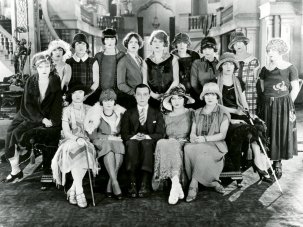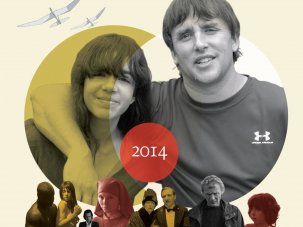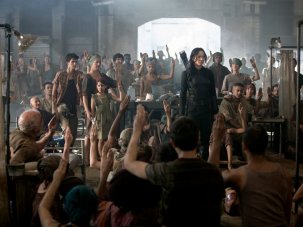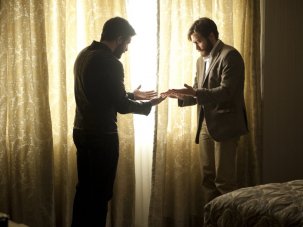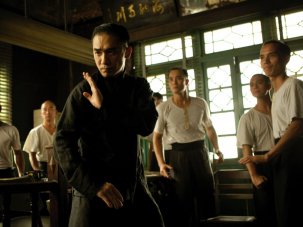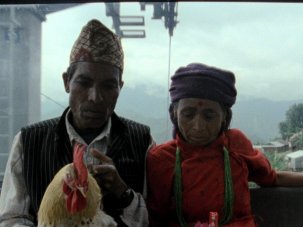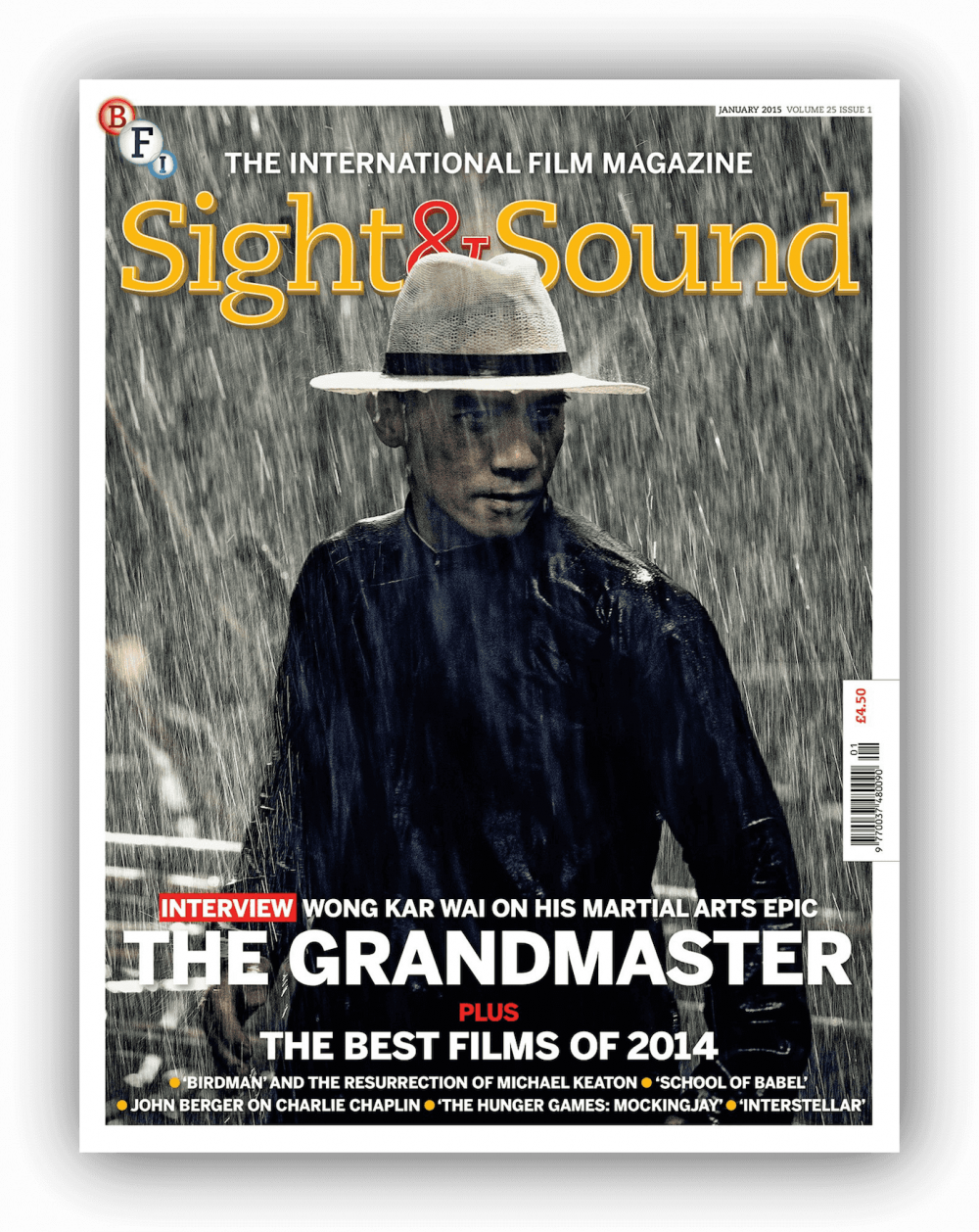
As 2014 moves into the rearview mirror, our new issue casts a look back, with more than 100 of our contributors reflecting on the trends and highlights in cinema and television, and casting their ballots for the outstanding titles of the year.
Posted to subscribers and available digitally 28 November
→
→ Sign up / log in
On UK newsstands 2 December
Has it been a vintage one for narrative cinema? For documentary? What have been the controversies, standout titles and stories that have shaped cinema? Nick James introduces our survey, while Kim Newman picks the year’s standout horror movies, Nick Pinkerton examines the year’s highlights in action cinema, Pamela Hutchinson looks at what 2014 had to offer fans of silent and archive cinema and Jonathan Romney asks whether 2014 demonstrated a steady decline in genuinely adult cinema.
As for our balloters’ top of the pops, you can see their consensus titles here online – and browse many more of their choices and comments across 13 pages of our issue.
December also sees the (very) long-awaited return of one of the key figures in world cinema, Wong Kar Wai, whose martial-arts epic The Grandmaster sees him tell the story of the famed martial-arts teacher Ip Man, and pay tribute to the kung fu movies he grew up with, while also moving into bigger-budget territory. The opulent visuals and unmistakeable sense of style remain, but does Wong’s narrative lose its way in the battle between style and substance, asks Tony Rayns?
Wong meanwhile talks to James Bell about the film’s production and his lifelong fascination with martial arts, while Leon Hunt explores the history of kung fu movies that showcase genuine fighting techniques alongside the fictional exploits of real-life historical martial-arts masters like Ip Man.
Another figure making something of a comeback this month is Michael Keaton, who stars in director Alejandro González Iñárittu’s Birdman as a onetime star of the fictional titular superhero franchise, now trying to reclaim some sense of personal and artistic integrity by appearing in theatre on Broadway. Paul Julian Smith explores how the film sees Iñárittu jettison the weighty metaphysical issues of his previous work in favour of a welcome lightness of touch, while Anne Billson celebrates the return of Keaton, a much-loved actor with an enormous range.
One figure who of course has never gone away is Charlie Chaplin’s Tramp, arguably the most instantly recognisable and beloved of film characters even today, a full century since he first lit up cinema screens. John Berger considers the enduring appeal of the characters and of Chaplin’s early films, and argues that not only have they lost none of their surprise, humour, bite or illumination, but that their relevance now seems more urgent than ever.
Our Wide Angle section includes a number of reports from this year’s Viennale, one of the essential events in the cinephile calendar, as well as a look at the varied, decade-long collaboration between Ennio Morricone and Pier Paolo Pasolini.
Reviews meanwhile gather opinion on all of the latest UK theatrical releases, including Christopher Nolan’s Interstellar, Denis Villeneuve’s Enemy, The Hunger Games: Mockingjay Part 1 and Manakamana. In DVD and Blu-ray, we welcome new discs of two of Monte Hellman’s unorthodox westerns alongside a spiffing new edition of Withnail & I and much more. And the Books section includes a new study of the work of Terence Davies and a collection on the life and work of Amos Vogel.
All this and more besides…
-
Sight & Sound is now available in digital editions for Apple iOS, Android and Kindle Fire as well as computer desktops. Scroll this gallery to browse this issue’s sections.
-
RUSHES: the meeting of jazz and cinema in 1960s Poland, Julie Bertucelli on integrationist French education in School of Babel, five key Marx Brothers scenes, Hannah McGill on movie teapots and more of Mark Cousins’s ideal film-school syllabus.
-
THE INDUSTRY: the making of Kajaki: The True Story, how Mr. Turner became Mike Leigh’s biggest hit, the sad death of BFI Film Fund executive Chris Collins and Jane Roscoe of the London Film School.
-
COVER FEATURE: Wong Kar Wai’s respect for traditional martial arts is clear in The Grandmaster. But does his narrative lose its way in the battle between style and substance? Plus Wong on the production, and real-life martial-arts masters like Ip Man.
-
Birdman sees Alejandro González Iñárritu find a welcome new lightness of touch, argues Paul Julian Smith PLUS Anne Billson looks back over the career of the film’s star, Michael Keaton.
-
Nick James introduces our survey of the year in film and television; plus Kim Newman on horror highlights, Nick Pinkerton on action, Pamela Hutchinson on silent and archive film and Jonathan Romney on adult popular cinema.
-
Charlie Chaplin’s early films have lost none of their surprise or humour or bite or illumination, and their relevance now seems more urgent than ever, writes John Berger.
-
WIDE ANGLE: Kieron Corless reports from the Viennale; Algerian filmmaker Tariq Teguia; the 16mm strand at this year’s Viennale; an impending threat to Europe’s cultural pluralism; Morricone’s work with Pasolini; the treats on display at Pordenone.
-
REVIEWS: Enemy, The Hunger Games: Mockingjay Part 1, Interstellar + 36 more new releases.
-
HOME CINEMA: heading west with Monte Hellman’s The Shooting and Ride in the Whirlwind, toasting Withnail & I, recalling Christine Pascal’s family tragedy Le Petit Prince a dit + 15 more releases reviewed.
-
BOOKS: a study of Terence Davies, a collection of writing by and about Amos Vogel, a wide-ranging volume of essays on Hou Hsiao-Hsien and an examination of cinema and nationalism in France.
-
ENDINGS: Sunday Bloody Sunday.
Features
Cover feature: The horizontal Wong Kar Wai
Wong Kar Wai’s respect for traditional martial arts is firmly in evidence in his vividly authentic The Grandmaster, which explores the life of the legendary wing chun teacher Ip Man. But does his narrative lose its way in the battle between style and substance? By Tony Rayns.
Plus: In the mood for kung fu
Wong Kar Wai explains his lifelong fascination with martial arts, why he was determined to bring a new realism to the genre, and why quality films, like the finest stews, should never be made in a hurry. Interview by James Bell.
Plus: The birth of a legend
The Grandmaster sits in a tradition of kung fu movies showcasing genuine fighting techniques alongside the fictional exploits of real-life historical martial-arts masters like Ip Man . By Leon Hunt.
Flight of fancy
Birdman, Alejandro González Iñárritu’s tale of an actor looking to get his career flying again years after walking out on a superhero franchise, sees the director jettisoning the weighty metaphysical issues of his previous work in favour of a welcome lightness of touch. By Paul Julian Smith.
Films of the year
Quality narrative cinema gets the usual thumbs-up in our 2014 poll, but some exceptional documentaries were arguably more important – while shifts within the industry, particularly in its relationship with television, should make for an intriguing 2015. By Nick James
Plus: The year in review
Lists and comment by 50 of our year-end poll contributors.
Some notes about the art of falling
In the century that has passed since The Tramp first strolled into the frame on cinema screens, the world has changed deeply. Yet Charlie Chaplin’s early films have lost none of their surprise or humour or bite or illumination, and their relevance now seems more urgent than ever. By John Berger.
Regulars
Editorial
More or less about acting
Rushes
In the frame: Sounds of the underground
Jazz signified liberation across the old Eastern Bloc but in Poland it emerged, with cinema, in the vanguard of a creative revolution. By Michael Brooke.
Object lesson: Something brewing
At once humble and elevated, tea’s signifying of both familial warmth and stiff snobbery makes for a neat cinematic shorthand. By Hannah McGill.
The five key…: Marx Brothers scenes
To mark a forthcoming BFI season, we offer a selection of moments that shows the dazzling breadth of the brothers’ anarchic genius. By Nick Bradshaw.
Interview: A world of difference
Julie Bertucelli’s uplifting classroom documentary School of Babel offers an insightful child’s-eye view of the immigrant experience in France. By Nick Bradshaw.
Dispatches: 50 weeks to learn film, part 2
In the second half of my ideal film-school syllabus, the students would ponder sex, secrets and memory in films, and perhaps drop some acid. By Mark Cousins.
The industry
Development tale: Kajaki: the true story
Making a British war film that fights shy of polemic called for innovative funding and the ability to steal a march on the MoD. By Charles Gant.
The numbers: Mr. Turner
Brewster: ‘A tireless enabler’
The death of Chris Collins, an experienced and talented BFI Film Fund executive, is a devastating loss to the British film industry. By Ben Roberts.
Profile: The educators
With the London Film School’s move to a new site imminent, its director Jane Roscoe looks forward to a new chapter in its history. By Geoffrey Macnab.
Wide angle
Viennale overview: Hands over the city
By skipping the hoopla of red carpets and celebrities, Vienna’s film festival can focus on what really matters: the cinematic image. By Kieron Corless.
Viennale director profile: Lost in la Madrague
Algerian filmmaker Tariq Teguia’s camera is forever restless, reflecting the uncertain experience of a new generation of young Arabs. By Michael Pattison.
Viennale 16mm survey: Game changer
The Viennale’s 16mm strand paid tribute to a format with a mixture of the canonical and the forgotten and sidelined. By Olaf Möller.
Opinion: Tipping point
The transatlantic trade agreement known as TTIP could pose a threat to Europe’s long-cherished support of cultural pluralism. By Holly Aylett.
Soundings: Dissonance as dissent
It wasn’t just Sergio Leone – composer Ennio Morricone also enjoyed a varied, decade-long collaboration with Pasolini. By Pasquale Iannone.
Primal screen: The world of silent cinema
The latest Pordenone festival offered Russian comedy, a Barrymore family portrait and a splash of colour. By Geoff Brown.
Reviews
Films of the month
Enemy
The Hunger Games: Mockingjay Part 1
Interstellar
plus reviews of
Algorithms
The Best of Me
Birdman or (The Unexpected Virtue of Ignorance)
Black Sea
Bogowie
Bonobo
Bringing Tibet Home
The Circle
Diplomacy
Dumb and Dumber To
Eastern Boys
Electricity
The Face of Love
The Grandmaster
The Green Prince
Hello Carter
Horns
Horrible Bosses 2
The Kingdom of Dreams and Madness
Kon-Tiki
Manakamana
Mea Culpa
Me, Myself and Mum
Men, Women & Children
Merchants of Doubt
Nativity 3: Dude, Where’s My Donkey?!
Northern Soul
One Rogue Reporter
Open Bethlehem
Ouija
Redirected
School of Babel
St. Vincent
The Theory of Everything
We Are the Giant
The Woman in Black: Angel of Death
DVD features
Way out west: The Shooting / Ride in the Whirlwind
Monte Hellman’s strange career produced some of American cinema’s most individual and unorthodox westerns. Reviewed by Nick Pinkerton.
Revival: Withnail and I Limited Edition
Withnail was the heavy-drinking blueprint for many male flat-share sitcoms – but sober reappraisal reveals it to be full of darker themes. Reviewed by Kate Stables.
Lost and found: Le Petit Prince a dit
This sensitive tale of divorced parents and their perilously ill daughter is one of the great French films about childhood tragedy. Reviewed by Neil Sinyard.
plus reviews of
Bunny Lake Is Missing
The Day the Earth Caught Fire
The Death Kiss
Diary of a Lost Girl
The Girl Hunters
Mouchette
Style Wars
The Complete Jacques Tati
Unearthly Stranger
Verdun
Looking at History
The Visitor
Welcome to New York
Television reviews of
The Glittering Prizes
Penny Dreadful
Books
In Search of Lost Time: Terence Davies
Be Sand, Not Oil: The Life and Works of Amos Vogel
Hou Hsiao-Hsien
Nationalism and the Cinema in France: Political Mythologies and Film Events, 1945-95
Letters
Opening up to women’s cinema and criticism
A letter from Stanley Kubrick
More filmed painters and paintings
Leviathan and Russian clericism
Endings
Sunday Bloody Sunday
John Schlesinger’s subtle, complex portrait of the painful break-up of a ménage-à-trois reveals more about Englishness than it does about sex. By Noel Hess.
Further reading
-
The Digital Edition and Archive quick link
Log in here to your digital edition and archive subscription, take a look at the packages on offer and buy a subscription.




